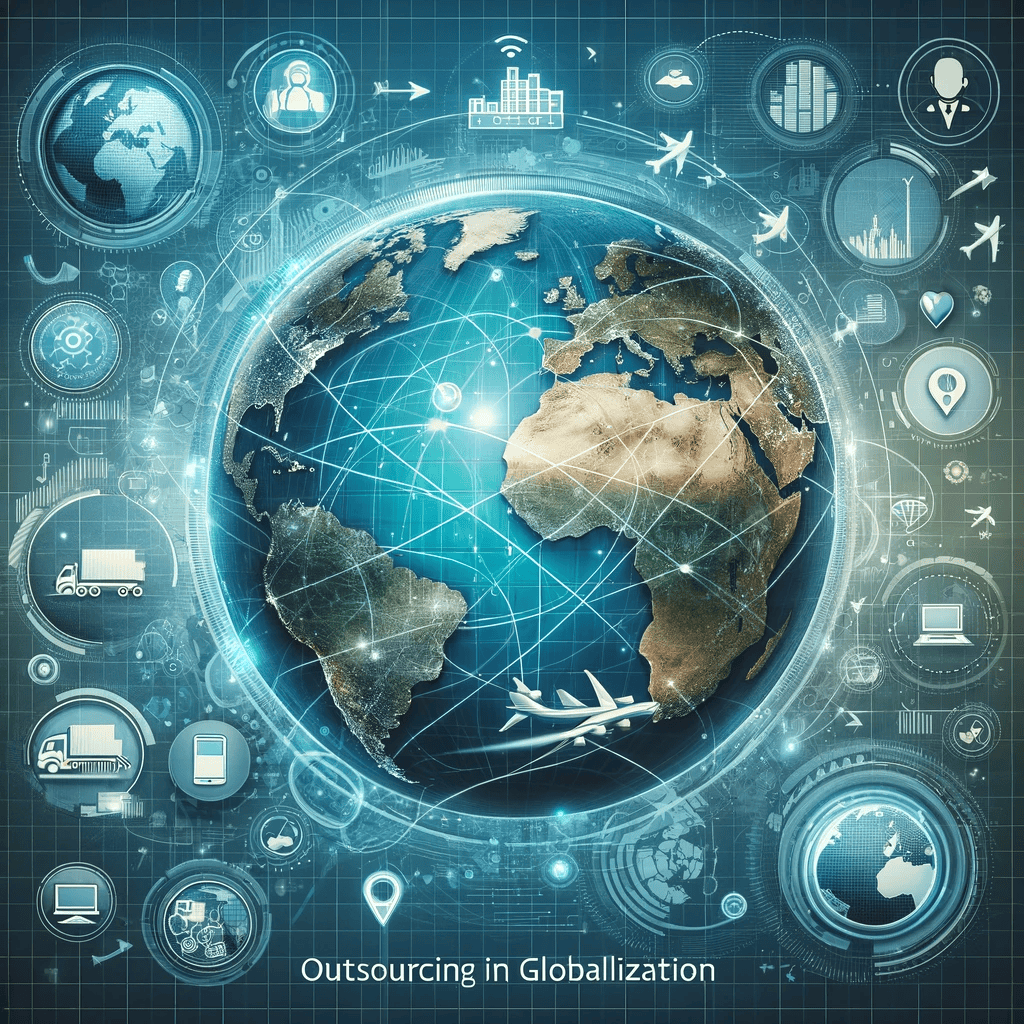In the ever-evolving tapestry of globalisation, outsourcing has emerged as a crucial thread, weaving together diverse economies with the promise of efficiency and growth. Outsourcing in Globalization is not just about looking at a trend; it is about decoding a complex phenomenon that shapes how companies operate and how countries develop. This intricate dance between the global demand for services and the strategic distribution of work across borders can be both a boon and a bane, depending on the choreography of policies, corporate strategies, and market forces at play. In this exploration, we shall unveil the multifaceted pros and cons of outsourcing in a world that is increasingly without borders.
The concept of outsourcing – delegating tasks or jobs from internal production to an external entity – has transformed the landscape of international business. Outsourcing is a cornerstone strategy that allows businesses to focus on core competencies, reduce costs, and improve service quality, leveraging the advantages that different geographical regions offer. However, the brushstrokes of outsourcing are broad, and their impact on the global canvas is varied. While some praise the economic efficiencies and opportunities for innovation it brings, others criticise its role in job displacement and its contribution to a race to the bottom in labour standards.
Diving into the advantages, outsourcing can be the wind beneath the wings of businesses, large and small. It allows for agility in a competitive market, where the rapid deployment of services and adaptation to new technologies are crucial for survival. Access to a global talent pool ensures that expertise is not bound by geography, painting a picture of a collaborative, interdependent world. Economically, it can be a lighthouse for developing nations, guiding them towards industrialization and employment opportunities that may not otherwise arise.
Conversely, the shadow of outsourcing casts long and complex silhouettes. The cons are not just footnotes in an otherwise positive narrative; they are substantial chapters that warrant close examination. From the erosion of domestic job markets to the ethical quagmires of labour exploitation in low-cost regions, outsourcing can sometimes deepen economic divides rather than bridge them. The quality of service, the loss of managerial control, and the risk of exposing confidential information are additional brushstrokes that add to the darker hues of the outsourcing debate.
As we unpack the layers of outsourcing in the context of globalisation, this blog will serve as a compass to navigate through the glowing opportunities and the lurking challenges. We will dissect the elements that make outsourcing a key global business strategy while acknowledging the pitfalls that must be addressed to harness its full potential. This introduction is but the map to the treasure trove of insights that await, as we embark on a journey to understand the delicate balance of outsourcing in the intricate web of global economics. Join us in this intellectual odyssey as we unravel the pros and cons that define the essence of outsourcing in our interconnected world.
The Basics of Outsourcing
Outsourcing has undergone a dramatic transformation from its modest inception to becoming a cornerstone of modern global business strategy. What began as companies seeking cost-effective ways to handle non-core functions has burgeoned into a comprehensive approach to harness international workforce and technology for operational efficiency. This strategy termed what is outsourcing in globalisation, has evolved through the centuries from simple local trade agreements to complex offshore operations across continents.

What is Outsourcing in Globalization
Outsourcing is inextricably linked to globalisation. The practice has grown in prominence with the expansion of global trade, where companies capitalise on less expensive labour markets and advanced foreign expertise to enhance competitiveness. What is outsourcing in globalisation? It is essentially a byproduct of economic globalisation that allows businesses to break free from geographical constraints and leverage global supply chains for optimal performance and profitability.
Historical Context of Outsourcing
Historically, outsourcing can be traced back to the Industrial Revolution, but it’s the last few decades that have seen the exponential rise of outsourcing in globalisation. Firms realised they could outsource labour-intensive tasks to countries with lower labour costs. An iconic example is the offshoring of manufacturing jobs from the United States to China, transforming the global manufacturing landscape and redefining the global labour market.
Examples of Outsourcing Impact
Examples of the economic impact of outsourcing abound, from the BPO boom in India to the IT revolution in Ireland. These instances underscore the outsourcing advantages within the global market expansion, showcasing the economic upliftment of whole regions through targeted international business strategies.
Outsourcing Services
The range of outsourcing services has expanded from manufacturing to include knowledge-intensive sectors like IT, legal, and healthcare services. The ‘outsourcing solutions for businesses’ now cover a spectrum of operations that can be tailored to meet the specific needs of companies looking to outsource.
Managing Offshore Outsourcing
Effective management of offshore outsourcing is pivotal. Companies must devise outsourcing strategies in the global market that mitigate risks and foster ethical practices. Managing offshore outsourcing effectively means navigating through the complexities of globalisation challenges and ensuring the outsourcing’s impact on local economies is beneficial and sustainable.
Outsourcing Trends and Economic Impact
Keeping abreast with outsourcing trends is crucial for businesses to remain competitive. ‘Outsourcing trends in the global economy’ point to a rise in automation and demand for higher-skilled tasks. Understanding the ‘economic impact of outsourcing services’ informs businesses of the ripple effects their outsourcing decisions can have on both global trade and local economic fabrics.
In leveraging what is outsourcing in globalisation, businesses must balance immediate cost savings against the broader socio-economic canvas, integrating effective strategies for a harmonious global impact.
The Pros of Outsourcing in Globalization
Cost efficiency is the cornerstone of outsourcing in globalisation. It allows for the transfer of various business processes to third-party vendors in countries with lower labour costs. For example, data from the Global Outsourcing Survey by Deloitte indicates a significant margin reduction in operational costs for companies leveraging outsourcing solutions. By integrating global supply chain practices, businesses enhance their economic impact and maintain a leaner budget while sustaining product and service quality.
Comparative Cost Analysis of In-House vs. Outsourced Services
| Service | In-House Cost | Outsourced Cost |
| Customer Support | £50/hr | £30/hr |
| IT Support | £70/hr | £45/hr |
| Data Entry | £20/hr | £10/hr |
Access to Specialized Skills through Outsourcing
Outsourcing in globalisation provides access to a pool of international talent and specialised skills that may not be readily available locally. This facet of global business strategy aligns with the growth of business process outsourcing, where entities like India’s IT sector not only offer technical expertise but also innovation and advanced problem-solving abilities, contributing to the global outsourcing industry’s advancement.
Global Talent Availability for Specialized Skills
| Skill | Local Availability | Global Availability |
| Advanced IT | Moderate | High |
| Multilingual Support | Low | High |
| Data Analytics | Moderate | High |
Concentrating on Core Competencies
Outsourcing strategies in the global market empower businesses to focus on their primary goals and core competencies. With operational tasks being managed externally, resources can be redirected towards innovation, research, and development. KPMG’s findings reveal that 57% of businesses outsource to align their workforce with core business activities, thereby optimising their internal assets for market competition and growth.
Impact of Outsourcing on Core Business Focus
| Core Activity | Without Outsourcing | With Outsourcing |
| Product Development | 25% time allocation | 40% time allocation |
| Market Strategy | 20% time allocation | 35% time allocation |
Scalability and Flexibility Advantages
The scalability and flexibility provided by outsourcing are unmatched, as reflected in outsourcing trends within the global economy. Outsourcing solutions for businesses offer the adaptability to efficiently adjust to market demands and expansion efforts without the traditional barriers faced by in-house operations. IBM’s insights stress the value of such flexibility, where companies can swiftly adapt operations, enhancing their global market expansion capabilities.
Business Scalability Comparisons
| Business Size | In-House Scalability | Outsourced Scalability |
| Small | Limited | High |
| Medium | Moderate | High |
| Large | High | Very High |
The Cons of Outsourcing in Globalization
What is outsourcing in globalisation if not a delicate dance of control? Handing over the reins of business processes to third parties can lead to a significant loss of control, which is a substantial concern for many global enterprises. Monitoring and managing outsourced activities can become complex when they are conducted across different time zones and management practices. A survey by the Outsourcing Institute found that 30% of companies outsourcing services faced challenges in contract management, indicating a control lapse that can lead to inefficiency and financial losses.

Management Challenges in Outsourced Services
| Process | Control Challenge | Percentage of Companies Affected |
| IT Services | Contractual Compliance | 35% |
| Customer Service | Quality Monitoring | 40% |
| Manufacturing | Inventory Management | 30% |
Quality Control in Outsourcing
Quality concerns are one of the principal risks associated with outsourcing in globalisation. The difference in standards and the absence of hands-on supervision can lead to inconsistencies and a decrease in the quality of output. As per a study by the International Association of Outsourcing Professionals, 25% of companies that outsource report dissatisfaction with the quality provided by offshore outsourcing companies, underlining the need for robust quality assurance protocols in international business agreements.
Quality Issues Reported by Outsourcing Companies
| Service Area | Quality Issues | Reported Incidents |
| Product Development | Specifications Mismatch | 20% |
| Customer Support | Communication Gaps | 25% |
| Technical Support | Technical Incompetence | 15% |
Data Security and Confidentiality in Global Outsourcing
Security and confidentiality pose significant concerns in the context of outsourcing in globalisation. The transfer of sensitive information across borders increases the risk of data breaches and intellectual property theft. Industry reports from the Global Outsourcing Association highlight that 40% of businesses are apprehensive about data security when outsourcing, especially in business process outsourcing sectors where data handling is pivotal.
Security Incidents in Outsourcing Relationships
| Sector | Incident Type | Incident Rate |
| Finance | Data Breach | 45% |
| Healthcare | Confidentiality Breach | 30% |
| IT | IP Theft | 25% |
Navigating Cultural and Communication Barriers
Cultural and communication barriers significantly impede the smooth operation of outsourcing services. Despite the advantages of a global labour market, differences in language, work ethic, and business etiquette can lead to misunderstandings and inefficiencies. A global outsourcing industry report shows that cultural misalignment can increase project timelines by up to 25%, stressing the need for effective cross-cultural communication strategies in offshoring benefits.
Cultural Misalignment Impact on Project Timelines
| Region | Cultural Barrier | Increased Timeline |
| Asia-Pacific | Language Proficiency | 20% |
| Latin America | Business Etiquette | 15% |
| Eastern Europe | Work Ethics | 10% |
Globalization’s Role in Outsourcing
Globalisation has been the bedrock upon which the towering structure of outsourcing has been built. As the world became a global village, the question of ‘what is outsourcing in globalisation’ began to be answered with tangible examples: companies leveraging the global labour market to reduce costs and increase efficiency. A McKinsey report indicates that the economic impact of outsourcing accounts for a 5% increase in productivity in the global economy.
Technology and Connectivity: The Transformation of Outsourcing
The explosion of technology and connectivity in the past decades has revolutionised outsourcing in globalisation. Cloud computing and high-speed internet have created a seamless integration of outsourcing services into the global supply chain. This digital transformation, as noted by a Deloitte survey, has led 65% of global businesses to leverage outsourcing for tasks ranging from customer service to advanced AI analytics, thus becoming an integral part of global business strategy.
Adoption of Technological Advances in Outsourcing
| Technology | Adoption Rate | Impact |
| Cloud Computing | 70% | Scalability and Flexibility |
| AI and Automation | 50% | Efficiency and Precision |
| High-speed Internet | 90% | Real-time Communication |
Trade Agreements and Policies: Steering Outsourcing Decisions
Trade agreements and international policies have often directed the sail of outsourcing. The role of free-trade agreements has been substantial in facilitating offshoring benefits by reducing tariffs and thus the costs associated with global trade. For instance, the North American Free Trade Agreement (NAFTA) has increased the United States’ trade-based outsourcing to Mexico by 30%, demonstrating how policy can influence outsourcing strategies.
Impact of Trade Agreements on Outsourcing
| Agreement | Trade Increase | Outsourcing Increase |
| NAFTA | 30% | 25% |
| EU Free Trade | 20% | 15% |
| ASEAN | 10% | 12% |
The essence of what outsourcing is in globalisation lies in its mutual benefits for the involved parties. It’s a phenomenon born out of economic necessities and technological advancements, shaping the international business landscape. Recognizing the economic impact of outsourcing services, businesses have adopted global outsourcing strategies, which in turn have dictated significant shifts in the global labour market, leading to the expansion of the global outsourcing industry.
Strategies for Effective Outsourcing
To understand ‘what is outsourcing in globalisation,’ it’s essential to recognize it as a strategic tool for global market expansion, offering access to a broader international workforce and a range of outsourcing services. Effective outsourcing strategies can significantly enhance a company’s competitive edge in the global trade arena.

Identify Core Objectives and Outsource Accordingly
Determine which aspects of your business can benefit from outsourcing. This may range from customer service to back-end support like business process outsourcing (BPO). With clear objectives, you can capitalise on outsourcing advantages by directing resources toward areas that offer the most significant return on investment.
Choose the Right Outsourcing Partner
The choice of an outsourcing partner should be based on a thorough analysis of the vendor’s track record, expertise in the global outsourcing industry, and ability to provide scalable outsourcing solutions. A Gartner study highlights that 80% of companies regard expertise as a crucial factor when selecting an outsourcing partner.
Criteria for Selecting an Outsourcing Partner
| Criteria | Importance Rating | Notes |
| Expertise | High | Key to ensuring quality and efficiency |
| Scalability | Medium | Allows flexibility for business growth |
| Cost | Medium | Important but not at the quality expense |
Mitigate Risks through Effective Communication and Control
Clear communication channels and robust control mechanisms are vital to managing offshore outsourcing effectively. They serve as a safeguard against outsourcing risks such as quality issues and help in overcoming globalisation challenges like cultural and language barriers.
Regular Quality Assessments
Quality assessments are a fundamental part of outsourcing management. They ensure that the outsourcing effects remain positive, preventing any adverse economic impact of outsourcing services on your brand’s reputation.
Integration into Global Supply Chain
Seamless integration of outsourcing services into your global supply chain is crucial for maintaining the economic impact that outsourcing has on overall operational efficiency. Regular reviews of global labour market statistics can inform your strategy, adapting to outsourcing trends in the global economy.
Impact and Adjustment
Measure the impact of your outsourcing strategies on local economies and adjust your practices accordingly. This not only strengthens the outsourcing impact on the economy but also enhances the perception of your brand in international business circles.
Stay Informed and Adapt to Outsourcing Trends Keep abreast of the latest outsourcing trends in the global economy. This will allow you to anticipate and act on globalisation and its effect on outsourcing, thus maximising the benefits of outsourcing in global business.
Adhering to these strategies ensures that companies looking to navigate ‘what is outsourcing in globalisation’ can do so with a robust framework designed to optimise the process. By following these practices, organisations can enhance their international business strategies, ensuring that the economic impact of their outsourcing is felt positively across the global supply chain.
Conclusion
In navigating the multifaceted landscape of outsourcing within the context of globalisation, we come to understand its dual nature. Outsourcing, when harnessed strategically, can be a catalyst for growth and efficiency. It opens up avenues for global market expansion, allows access to a skilled international workforce, and can lead to substantial cost savings, all of which are compelling advantages in the competitive global economy. These benefits often translate to enhanced productivity and profitability, as businesses can focus on core competencies while outsourcing non-core activities to specialised firms around the world.
However, the journey through outsourcing is not without its challenges. Quality control, data security, cultural nuances, and communication hurdles present significant risks that businesses must navigate. The economic impact of outsourcing can also not be ignored, as it has profound implications for local economies and labour markets. A balance must be struck between leveraging the global labour pool and supporting domestic employment.
The key takeaway is that outsourcing, as a facet of globalisation, is neither wholly good nor bad. It’s a complex tool that, if managed with due diligence, can support a company’s ascent in the global market. It demands careful consideration of outsourcing strategies, a clear understanding of the global supply chain, and a vigilant approach to mitigating associated risks.
In conclusion, as the global business environment continues to evolve, so too must our strategies for outsourcing. By staying informed about global trade dynamics, remaining adaptable to international business trends, and adhering to ethical standards, businesses can optimise the benefits of outsourcing while mitigating its downsides. With the right approach, outsourcing can be a powerful engine for growth, innovation, and success in the global marketplace.
FAQs
What is outsourcing in globalisation?
Outsourcing in globalisation refers to the practice of a company delegating certain tasks, operations, services, or jobs to external firms or individuals, often in other countries, rather than completing them internally. This is done to leverage global efficiencies such as lower labour costs, specialised skills, or more favourable economic conditions that contribute to reduced operational expenses and increased productivity.
What are the advantages of outsourcing in global business?
The advantages of outsourcing in global business include cost savings due to lower labour costs in other regions, access to a larger pool of skilled labour, the ability to operate around the clock by utilising time zone differences, and the flexibility to scale operations up or down without the constraints of local employment laws and obligations.
What challenges does offshore outsourcing face?
Offshore outsourcing faces challenges such as cultural and language barriers, time zone differences that complicate communication, concerns over data security and privacy, the risk of losing control over the quality and timeliness of the outsourced work, and potential backlash from local communities and labour markets due to offshoring jobs.
How does outsourcing impact local economies?
Outsourcing can impact local economies by leading to job losses as companies relocate operations overseas, which can depress wages and reduce employment opportunities. However, it can also contribute to local economies by allowing businesses to become more competitive globally and potentially freeing up resources to create new kinds of jobs in the local market.
What are the solutions for effective outsourcing?
Solutions for effective outsourcing include thorough vetting of potential vendors, establishing clear communication channels and protocols, defining service level agreements (SLAs) with precise expectations and benchmarks, implementing robust data security measures, and maintaining some level of oversight and quality control over the outsourced operations.
What strategies are used for outsourcing in the global market?
Strategies used for outsourcing in the global market include identifying core vs. non-core activities, selecting the right vendor through a rigorous procurement process, diversifying outsourcing partners to mitigate risks, negotiating contracts with clear terms and performance metrics, and maintaining effective cross-cultural communication and project management practices.
What is the economic impact of outsourcing services?
The economic impact of outsourcing services includes increased efficiency and lower production costs for businesses, which can lead to lower prices for consumers. It can stimulate economic growth in the service provider’s country through job creation and foreign direct investment. Conversely, it may also result in job displacement and reduced labour market opportunities in the client’s country.
What risks are associated with outsourcing?
Risks associated with outsourcing include loss of managerial control, communication issues due to language and cultural barriers, potential compromise of data security, intellectual property concerns, service delivery failing to meet expectations, and possible reputational damage if the outsourcing is not aligned with the company’s values or public sentiment.
What are the current trends in global outsourcing?
Current trends in global outsourcing include a shift towards cloud-based services, increased demand for high-end, knowledge-based outsourcing, the rise of automation and artificial intelligence services, a focus on partnership and value-driven relationships rather than just cost savings, and reshoring or nearshoring in response to geopolitical tensions and supply chain reliability concerns.
How does globalisation affect outsourcing?
Globalisation affects outsourcing by increasing the interconnectivity of markets, making it easier and more attractive for businesses to find and manage suppliers and partners around the world. It leads to more competitive markets, where companies are incentivized to seek cost reductions and efficiency improvements through outsourcing to remain competitive on a global scale.






